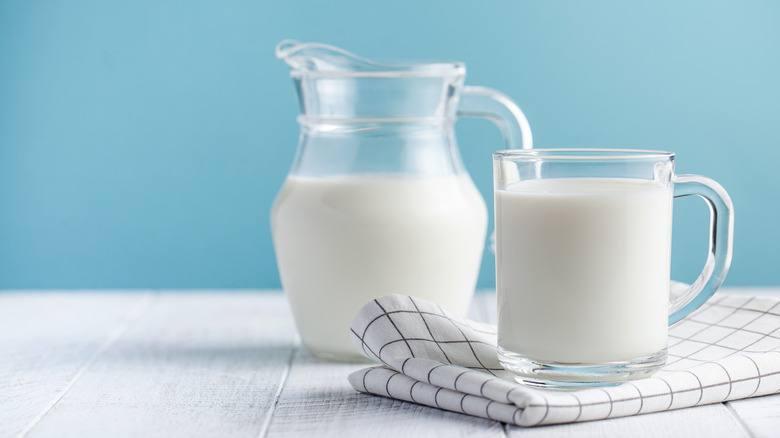The Maximum Amount Of Milk You Should Drink In A Day
From an early age, it's taught that drinking milk and eating cheese results in healthy and strong bones. The United States Department of Agriculture (USDA) 2020-2025 Dietary Guidelines for Americans doesn't say how many glasses of milk a person should drink a day. Instead, it focuses on how much dairy should be consumed. For a person who eats the recommended 2,000 calories per day, they should ingest three cups of dairy each day.
Dairy products are simply food items that are created from milk, such as cheese, yogurt, ice cream, and butter, according to Undeniably Dairy. This includes items made from cow's milk, as well as from other mammals, such as sheep and goats. All of these dairy products include important nutrients that are required to be healthy. Protein, calcium, vitamin B12, and vitamin D can all be found in dairy products. Not only does milk help make bones strong, but they also rebuild and repair muscle tissue, build and maintain strong teeth, and keep a person's nervous system working properly.
While the U.S. Department of Agriculture (USDA) recommends three glasses of milk (or dairy) per day, there is a small variation by age. For children ages two to three, two cups of dairy is recommended per day. That amount increases to 2 ½ cups for children ages four to eight, and then three cups become the standard for people ages nine and older.
Too much of a good thing?
When it comes to milk, can there be too much of a good thing? Yes, according to Livestrong. Drinking too much milk each day can lead to digestive issues, as well as possible complications from ingesting too many milk nutrients. While drinking the right amount of milk can help with maintaining a healthy weight, drinking too much can lead to the opposite. Not only does milk contain saturated fat, but it also has sugar. One cup of whole milk that contains 3.25% fat has 152 calories, 12 grams of sugar, 8 grams of fat, and 8.14 grams of protein, according to Healthline. Three glasses would equal 456 calories, while four glasses would be 608 calories.
Keep in mind, about 70% of adults cannot process lactose properly, according to Healthline, which means they may experience adverse effects from drinking milk. These symptoms include stomach pain and gas. Other digestive issues that can result from drinking too much milk include bloating, cramps, and diarrhea, per Health Spectra. In fact, some experts say there could be a link between drinking excessive milk and a higher risk of prostate cancer, reports Healthline. However, other studies have shown that the chances of someone getting colorectal cancer decrease when they consume dairy.
Like so many things in life, the answer is to enjoy your milk in moderation.

